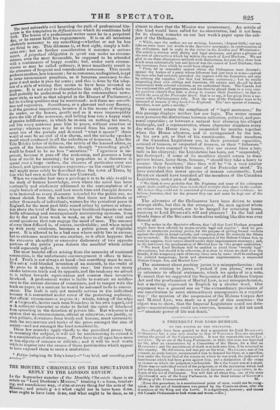THE MONTHLY CHRONICLE ON THE SPECTATORS REPLY TO THE LONDON
REVIEW.
IN the September number of the Monthly Chronicle there is an article on "Lord Durham's Mission," treating ii a loose, lumber- ing, and roundabout way, 01 almost every thing but the acts of the Mission ; and point ii g o it what cught not, to have been dune, what ought to have Leen done, and what ought to be done, so as
almost to show that the Mission was unnecessary. An article of this kind would have called for no observation, had it not been for its closing remarks on our last week's paper upon the sub- ject of the Ordinance.
" While, says the author, we are writing, however, (August Iith,) our eye falls on some MOM last words in the Spectator newspaper, in condemnation of the ordinances, and in reply to the writer in the London and Westminster. The article is written with ability and legal acuteness, and gives a glimpse of the sort of alternatives which lay within the reach of Lord Durham. We are glad to see these alternatives set forth with distinctness, because they show how much more substantially just and lenient was the course of Lord Durham, than any customary form which he could have adopted. " First, let us remember against whom the Ordinances were directed ; against the leaders of a party whose followers had just been in arms—against the men who had certainly provoked the rupture with the Executive, not only by refusing the supplies, (for that had become customary,) but by totally suspending their own sittings and functions, till cettain acts shook, be done inconsistent with colonial relations, as we understand them. The Canada Act has confirmed this self-suspension, and has thereby placed them in a very simi. tar position (should they take a fancy to resume their .fanctions) to that in which the sons of the Pretender stow-1; that is to say, it has given them a suc- cessor with a Parliamentary title. Now the sons of the Pretender were to be attainted of treason if they landed in Englund. The new species of treason,' therefore, is not quite a novelty."
1Ve cannot return the compliment of "legal acuteness;" for this passage displays neither law nor logic. The writer cannot even perceive the distinctions between collective, political, and per- sonal capacities ; or between a natural heir claiming his alleged birthright, and a representative, whose character slumbers every day when the Hoase rises, is suspended for months together wben the House adjourns and is extinguished by the law, by his own act, or that of his constituents. Some members of the Canadian Legislature are, in their personal capacities, accused of treason, or suspected of treason, or their " followers" may have been engaged in treason, (for our censor likes a lati- tude in his charges); the Legislature has been, not "suspended," but destroyed; if some of its members should return to their private homes, bang them, because, " should they take a fancy to resume their functions," then they will be " in a very similar position to that in which the sons of the Pretender stood." To have punished this newer species of treason consistently, Lord Duet' am should have banished all the members of the Canadian Legislature, under pain of death.
"We think it very probable that Mr. Papineau and some of his colleagues might desire nothing better than to take their trialfor their share in the contest. We believe they could not be convicted of treason on any direct evidence: we believe, however, that for the present they can and must be kept out of the colony."
The advocates of the Ordinances have been driven to some strange shifts, but this is the strangest. So, men against whom no crime can be proved, are to be bangel for returning home, contrary to Lord DURHAM'S will and pleasure ! In the bad and bloody times of the STUARTS themselves nothing like this was ever dreamt of.
"The writer in the Spectator affirms, that all that Lord Durham proposed might have been effected by means strictly legal and regular.' And he pro- ceeds to enumerate packing juries, for the purpose of getting formal verdicts against the eight in actual custody, and excepting from the amnesty the fifteen not in custody. Ile then suggests the suspension of the Habeas Corpus Act, in case,:we suppose, their return should render their imprisonment necessary ; and, in the last resort, the proclamation of Martial Law by the proper authorities.' " We trust Lord Durham will be enabled to avoid these strictly legal' alternatives; but should it be otherwise, it is clear to whom we shall owe the benefit, if the temporary exile of twenty• three men by name shall be exchanged for judicial tamperings, harsh and obnoxious imprisonments, a suspeuded Habeas Corpus Act, and Martial Law."
The statement about packing juries is a misapprehension : the phrase, in relation to juries, " picked if you please," was used in reference to official statements, which we spoke of in a note. To assert that we suggested the Suspension of the Habeas Corpus Act and the proclamation of Martial Law, is not misapprehension, but sumething expressed in English by a shorter word. Our argument was a general one on "the extraordinary provisions of our constitution to meet extraordinary emergencies in a regular way :" the mention of the suspension of' the Habeas Corpus Act and Martial Law, was made as a proof of this assertion: the object was to show, that the Imperial Legislature could not dele- gate—constitutionally could not exercise, because it did not need —" absolute power of life and death."


























 Previous page
Previous page